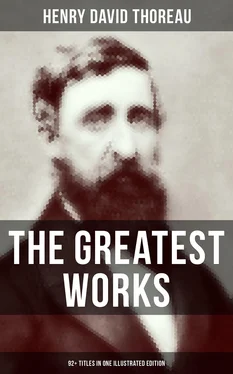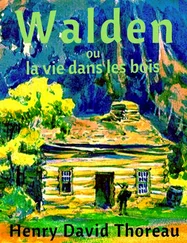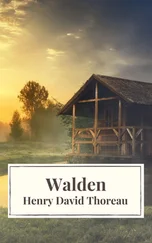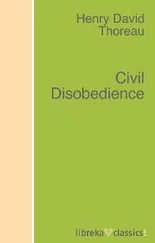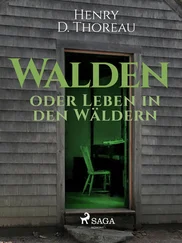The fog dispersed and we rowed leisurely along through Tyngsborough, with a clear sky and a mild atmosphere, leaving the habitations of men behind and penetrating yet farther into the territory of ancient Dunstable. It was from Dunstable, then a frontier town, that the famous Captain Lovewell, with his company, marched in quest of the Indians on the 18th of April, 1725. He was the son of "an ensign in the army of Oliver Cromwell, who came to this country, and settled at Dunstable, where he died at the great age of one hundred and twenty years." In the words of the old nursery tale, sung about a hundred years ago,—
"He and his valiant soldiers did range the woods full wide,
And hardships they endured to quell the Indian's pride."
In the shaggy pine forest of Pequawket they met the "rebel Indians," and prevailed, after a bloody fight, and a remnant returned home to enjoy the fame of their victory. A township called Lovewell's Town, but now, for some reason, or perhaps without reason, Pembroke, was granted them by the State.
"Of all our valiant English, there were but thirty-four,
And of the rebel Indians, there were about four-score;
And sixteen of our English did safely home return,
The rest were killed and wounded, for which we all must mourn.
"Our worthy Capt. Lovewell among them there did die,
They killed Lieut. Robbins, and wounded good young Frye,
Who was our English Chaplin; he many Indians slew,
And some of them he scalped while bullets round him flew."
Our brave forefathers have exterminated all the Indians, and their degenerate children no longer dwell in garrisoned houses nor hear any war-whoop in their path. It would be well, perchance, if many an "English Chaplin" in these days could exhibit as unquestionable trophies of his valor as did "good young Frye." We have need to be as sturdy pioneers still as Miles Standish, or Church, or Lovewell. We are to follow on another trail, it is true, but one as convenient for ambushes. What if the Indians are exterminated, are not savages as grim prowling about the clearings to-day?—
"And braving many dangers and hardships in the way,
They safe arrived at Dunstable the thirteenth (?) day of May."
But they did not all "safe arrive in Dunstable the thirteenth," or the fifteenth, or the thirtieth "day of May." Eleazer Davis and Josiah Jones, both of Concord, for our native town had seven men in this fight, Lieutenant Farwell, of Dunstable, and Jonathan Frye, of Andover, who were all wounded, were left behind, creeping toward the settlements. "After travelling several miles, Frye was left and lost," though a more recent poet has assigned him company in his last hours.
"A man he was of comely form,
Polished and brave, well learned and kind;
Old Harvard's learned halls he left
Far in the wilds a grave to find.
"Ah! now his blood-red arm he lifts;
His closing lids he tries to raise;
And speak once more before he dies,
In supplication and in praise.
"He prays kind Heaven to grant success,
Brave Lovewell's men to guide and bless,
And when they've shed their heart-blood true,
To raise them all to happiness."
"Lieutenant Farwell took his hand,
His arm around his neck he threw,
And said, `Brave Chaplain, I could wish
That Heaven had made me die for you.'"
Farwell held out eleven days. "A tradition says," as we learn from the History of Concord, "that arriving at a pond with Lieut. Farwell, Davis pulled off one of his moccasins, cut it in strings, on which he fastened a hook, caught some fish, fried and ate them. They refreshed him, but were injurious to Farwell, who died soon after." Davis had a ball lodged in his body, and his right hand shot off; but on the whole, he seems to have been less damaged than his companion. He came into Berwick after being out fourteen days. Jones also had a ball lodged in his body, but he likewise got into Saco after fourteen days, though not in the best condition imaginable. "He had subsisted," says an old journal, "on the spontaneous vegetables of the forest; and cranberries which he had eaten came out of wounds he had received in his body." This was also the case with Davis. The last two reached home at length, safe if not sound, and lived many years in a crippled state to enjoy their pension.
But alas! of the crippled Indians, and their adventures in the woods,—
"For as we are informed, so thick and fast they fell,
Scarce twenty of their number at night did get home well,"—
how many balls lodged with them, how fared their cranberries, what Berwick or Saco they got into, and finally what pension or township was granted them, there is no journal to tell.
It is stated in the History of Dunstable, that just before his last march, Lovewell was warned to beware of the ambuscades of the enemy, but "he replied, `that he did not care for them,' and bending down a small elm beside which he was standing into a bow, declared `that he would treat the Indians in the same way.' This elm is still standing (in Nashua), a venerable and magnificent tree."
Meanwhile, having passed the Horseshoe Interval in Tyngsborough, where the river makes a sudden bend to the northwest,—for our reflections have anticipated our progress somewhat,—we were advancing farther into the country and into the day, which last proved almost as golden as the preceding, though the slight bustle and activity of the Monday seemed to penetrate even to this scenery. Now and then we had to muster all our energy to get round a point, where the river broke rippling over rocks, and the maples trailed their branches in the stream, but there was generally a backwater or eddy on the side, of which we took advantage. The river was here about forty rods wide and fifteen feet deep. Occasionally one ran along the shore, examining the country, and visiting the nearest farm-houses, while the other followed the windings of the stream alone, to meet his companion at some distant point, and hear the report of his adventures; how the farmer praised the coolness of his well, and his wife offered the stranger a draught of milk, or the children quarrelled for the only transparency in the window that they might get sight of the man at the well. For though the country seemed so new, and no house was observed by us, shut in between the banks that sunny day, we did not have to travel far to find where men inhabited, like wild bees, and had sunk wells in the loose sand and loam of the Merrimack. There dwelt the subject of the Hebrew scriptures, and the Esprit des Lois, where a thin vaporous smoke curled up through the noon. All that is told of mankind, of the inhabitants of the Upper Nile, and the Sunderbunds, and Timbuctoo, and the Orinoko, was experience here. Every race and class of men was represented. According to Belknap, the historian of New Hampshire, who wrote sixty years ago, here too, perchance, dwelt "new lights," and free thinking men even then. "The people in general throughout the State," it is written, "are professors of the Christian religion in some form or other. There is, however, a sort of wise men who pretend to reject it; but they have not yet been able to substitute a better in its place."
The other voyageur, perhaps, would in the mean while have seen a brown hawk, or a woodchuck, or a musquash creeping under the alders.
We occasionally rested in the shade of a maple or a willow, and drew forth a melon for our refreshment, while we contemplated at our leisure the lapse of the river and of human life; and as that current, with its floating twigs and leaves, so did all things pass in review before us, while far away in cities and marts on this very stream, the old routine was proceeding still. There is, indeed, a tide in the affairs of men, as the poet says, and yet as things flow they circulate, and the ebb always balances the flow. All streams are but tributary to the ocean, which itself does not stream, and the shores are unchanged, but in longer periods than man can measure. Go where we will, we discover infinite change in particulars only, not in generals. When I go into a museum and see the mummies wrapped in their linen bandages, I see that the lives of men began to need reform as long ago as when they walked the earth. I come out into the streets, and meet men who declare that the time is near at hand for the redemption of the race. But as men lived in Thebes, so do they live in Dunstable to-day. "Time drinketh up the essence of every great and noble action which ought to be performed, and is delayed in the execution." So says Veeshnoo Sarma; and we perceive that the schemers return again and again to common sense and labor. Such is the evidence of history.
Читать дальше
